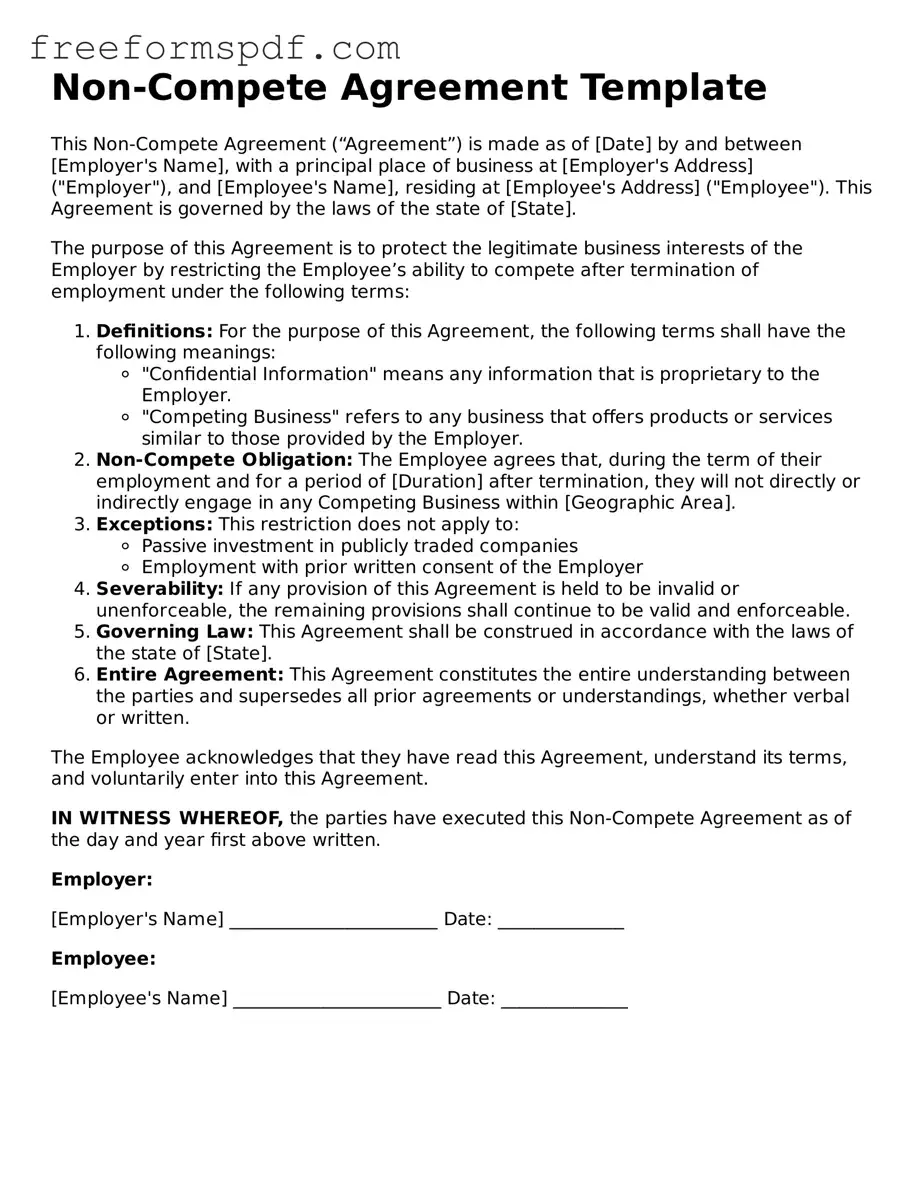Non-compete Agreement Document
Non-compete Agreement - Customized for Each State
Common mistakes
-
Not Understanding the Terms: Many individuals rush through the agreement without fully grasping what the terms mean. It’s crucial to read and comprehend each section, as misunderstandings can lead to serious consequences later on.
-
Failing to Specify Duration: A common mistake is not clearly defining the length of time the non-compete will be in effect. Without a specific duration, the agreement may be deemed overly broad or unenforceable.
-
Ignoring Geographic Limitations: Some people overlook the importance of specifying geographic boundaries. An agreement that restricts employment opportunities in an unreasonably large area can be challenged in court.
-
Neglecting to Include Consideration: It’s important to remember that a non-compete agreement must include something of value in return for signing. This could be a job offer, training, or other benefits. Without this, the agreement may not hold up legally.
Learn More on This Form
-
What is a Non-compete Agreement?
A Non-compete Agreement is a legal contract between an employer and an employee. It restricts the employee from engaging in activities that compete with the employer's business during or after employment. The goal is to protect the employer's trade secrets, business interests, and competitive advantage.
-
Why would an employer want a Non-compete Agreement?
Employers often seek Non-compete Agreements to safeguard their proprietary information and customer relationships. By preventing former employees from joining competitors or starting similar businesses, employers can maintain their market position and ensure that sensitive information does not become public knowledge.
-
Are Non-compete Agreements enforceable?
The enforceability of Non-compete Agreements varies by state. Some states impose strict limitations on their use, while others are more lenient. Generally, for a Non-compete Agreement to be enforceable, it must be reasonable in scope, duration, and geographic area. Courts often look for a balance between protecting the employer's interests and allowing the employee to work in their field.
-
How long do Non-compete Agreements last?
The duration of a Non-compete Agreement can differ widely. Some agreements may last for a few months, while others could extend for several years. The length must be reasonable and justifiable based on the nature of the business and the employee's role. Courts may not enforce overly long agreements that unduly restrict an employee's ability to find work.
-
What should be included in a Non-compete Agreement?
A well-drafted Non-compete Agreement typically includes:
- The specific activities that are restricted.
- The duration of the restrictions.
- The geographic area where the restrictions apply.
- Any exceptions to the restrictions.
- Consequences for violating the agreement.
-
Can I negotiate the terms of a Non-compete Agreement?
Yes, employees can negotiate the terms of a Non-compete Agreement before signing. It is advisable to discuss any concerns with the employer and suggest modifications to ensure the terms are fair and reasonable. Seeking legal advice during this process can also be beneficial.
-
What happens if I violate a Non-compete Agreement?
If an employee violates a Non-compete Agreement, the employer may take legal action. This could involve seeking an injunction to prevent the employee from continuing the competitive activity or pursuing damages for any losses incurred. The specific consequences depend on the terms of the agreement and the laws of the state.
-
Can I work in my field if I have signed a Non-compete Agreement?
While a Non-compete Agreement may limit your options, it does not necessarily prevent you from working in your field altogether. The key is to understand the specific restrictions outlined in the agreement. If the terms are too broad or unreasonable, they may not be enforceable. Consulting with a legal professional can help clarify your rights and options.
Misconceptions
Many people have misunderstandings about Non-compete Agreements. Here are six common misconceptions:
-
Non-compete agreements are always enforceable.
Not all non-compete agreements hold up in court. Their enforceability depends on the specific terms, state laws, and whether they are deemed reasonable in scope and duration.
-
They prevent employees from working in any job.
Non-compete agreements typically restrict employees from working in similar roles within a specific industry or geographical area, not from working in any job at all.
-
Signing a non-compete means you can never work in your field again.
This is not true. Most agreements are limited in time and space, allowing individuals to return to their field after the specified period.
-
Only executives and high-level employees need to sign non-compete agreements.
Non-compete agreements can apply to employees at various levels, depending on the company's policies and the nature of the work.
-
Non-compete agreements are the same as non-disclosure agreements.
These agreements serve different purposes. Non-disclosure agreements protect confidential information, while non-compete agreements restrict employment opportunities in similar fields.
-
You cannot negotiate the terms of a non-compete agreement.
Many individuals do negotiate these agreements. It is important to discuss terms before signing to ensure they are fair and reasonable.
Popular Forms:
Gift Letter Sample - Ensuring this letter accompanies any sizable gift can save potential headaches later.
For anyone seeking to navigate the rental landscape, understanding the Arizona Lease Agreement process is imperative. This document not only formalizes the rental relationship but also delineates the roles and responsibilities of both landlord and tenant.
Batting Line Up Strategy - Make it easy to reference player stats by filling out each section accurately.
